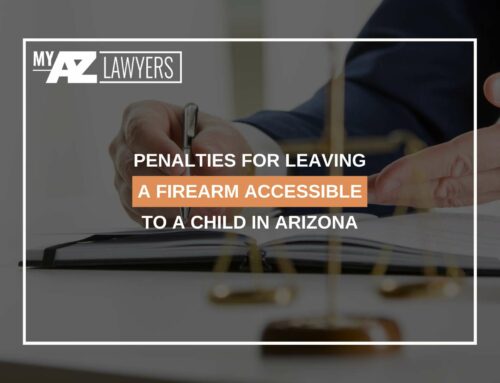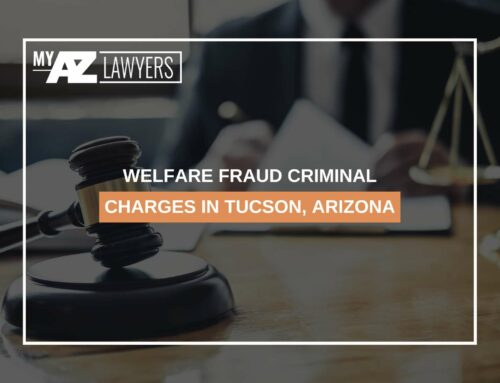Tax Fraud Revelations During Divorce Proceedings In Arizona
In a bitter divorce, spouses may be willing to use anything against each other to benefit themselves in property division, spousal maintenance, child support, and child custody matters. But the problem with weaponizing information obtained during the marriage is that it can often backfire. A common example of this scenario playing out is when one spouse threatens to expose marital tax fraud during a divorce. In particularly vindictive situations, that spouse might intend to follow through with the threat even if it will result in their own penalties. Read on to learn more about what could happen and what to do if these kinds of threats are made during a divorce in Arizona. To discuss in further detail based on your unique circumstances, call 480-470-1504 to schedule your free phone consultation with our firm.

Community Property In Arizona
Before reviewing how tax fraud allegations could come into play in an Arizona divorce, it’s important to understand how marital property is treated in Arizona. The two main methods of dividing marital property in the United States are equitable division and community property. Arizona follows the rules of community property. In community property states, all income, assets, and debt acquired throughout the marriage belong equally to both spouses. There are exceptions for property acquired by gift and inheritance. Even if a spouse takes out a loan or credit card in their name alone, their spouse could be held liable for its repayment in the event of a divorce. On the flip side, income, including retirement contributions, during the marriage is community property. Separate property can become commingled or transmuted into another state during the marriage. You should contact an experienced Arizona family law attorney if you wish to review your financial situation to determine how much belongs to the community estate. Our firm offers free initial consultations by phone- get started today by calling 480-470-1504.
Most Common Tax Fraud Violations
Single people know that a currently-popular cheeky prompt answer for the dating apps includes something about committing tax fraud. This isn’t very specific, because there are several ways that an individual or married couple could commit fraud on their taxes. Some of the most common forms of tax fraud, which can later reappear during divorce, are:
- Neglecting To Report Side Gigs & Other Income: While this type of tax fraud isn’t likely to result in jail time like some other violations, the financial penalties can be heavy. This type of fraud can be difficult for authorities to catch, especially if the individual receives cash as payment for their secondary employment. But that also makes it exactly the type of tax fraud that a spouse has the personal knowledge to report.
- Filing Falsified Tax Documents: Some commit tax fraud through omission, while others will outright or file completely falsified documents. The fines for document fraud are $250 to $2,000 per document for a first-time offender, and $2,000 to $5,000 per document for a subsequent offender. They can also be sentenced to up to 5 years in prison.
- Listing Personal Expenses As Business Expenses: Some businesses exist more as tax write-offs than actual companies that intend to make profits. An example of this type of tax fraud resulting in serious consequences is former NFL pro Bill Romanowski. The footballer and his wife were in dire straits with the IRS for reporting personal expenses, including salon appointments, rent, groceries, and veterinarian bills, as business expenses for their nutrition company, Nutrition53. They filed for bankruptcy just hours before a hearing on the matter.
- Fraudulent Property Transfers: A fraudulent property transfer is one in which the parties alter or hide the information in some way to avoid paying taxes on the transaction.
- Hiding Income In Offshore accounts: Financially savvy spouses might funnel some or all of their income in bank accounts in other countries to avoid paying taxes. When the IRS doesn’t uncover this type of fraud, a spouse could threaten to expose this information during an acrimonious divorce.
What If I Was Unaware Of The Tax Fraud?
In many marriages, one spouse is responsible for taxes and financial matters while the other spouse handles other responsibilities. Here, the spouse responsible for taxes could file a fraudulent joint tax return without any knowledge or involvement by the other spouse. This could eventually cause disastrous results for both spouses. But for a spouse who was unknowingly included on a fraudulent tax return, the burden will be on that individual to prove that they were unaware of the fraudulent nature of the tax filing.
An innocent spouse on a fraudulent tax return could have expensive tax bills to pay, along with other inconveniences and penalties. But an innocent spouse can mitigate this damage by filing a petition for Innocent Spouse Relief with the IRS. Innocent spouse relief can’t be used to eliminate tax debt from your own income, household employment taxes, Individual Shared Responsibility payments, business taxes, or trust fund recovery penalties for employment taxes.
There are other requirements that an individual must meet to qualify for Innocent Spouse Relief with the IRS. One of them is living in a community property state, which will be met in Arizona as this is a community property state. The spouse must be requesting relief from a joint return as opposed to an individual return. The spouse’s taxes must have been underrated due to errors on the return like unreported income, incorrect deductions and credits, and incorrect valuations of assets. Finally, the spouse must have been unaware of the errors. Factors that can include a spouse from Innocent Spouse Relief include signing an offer in compromise with the IRS, signing a closing agreement with the IRS, a court has issued a ruling denying relief, or the spouse participated in a related court proceeding but failed to request relief.
Are You Being Accused Of Tax Fraud By Your Ex, Or Considering Reporting Your Ex During Divorce? Learn More About Your Options With Our Arizona Family Law Team
Tax fraud allegations can make divorce, which is already a stressful experience, even more contemptuous. It can be tempting to use any factor possible to make your ex’s life difficult during divorce, even if it causes negative results to yourself. Accusing a spouse of tax fraud, even for joint filings, is one way to accomplish this goal. If you are in this kind of situation, you should consider retaining a divorce attorney to create an emotional barrier between yourself and your divorce case. A divorce attorney will provide you with sound advice when your instincts may be telling you to burn it all down. Your attorney will be responsible for communicating with opposing counsel and the courts, which can be beneficial if you aren’t feeling like your best self, which is completely normal for a divorce. A skillful divorce attorney will find the most efficient way to obtain orders pertaining to property division, spousal support, child support, and child custody that can work for your family going forward. Our dedicated Arizona family law team will put all of our knowledge and experience to work for you to achieve the best divorce resolution possible. We have represented thousands of clients just like you, delivering results that exceed expectations. To learn more, schedule your free consultation today by calling 480-470-1504. Don’t hesitate to contact us!
Arizona Offices:
Mesa Location:
1731 West Baseline Rd., Suite #100
Mesa, AZ 85202
Office: (480) 448-9800
Email: info@myazlawyers.com
Website: https://myazlawyers.com/
Phoenix Location:
343 West Roosevelt, Suite #100
Phoenix, AZ 85003
Office: (602) 609-7000
Glendale Location:
20325 N 51st Avenue Suite #134, Building 5
Glendale, AZ 85308
Office: (602) 509-0955
Tucson Location:
2 East Congress St., Suite #900-6A
Tucson, AZ 85701
Office: (520) 441-1450
Avondale Location:
12725 W. Indian School Rd., Ste E, #101
Avondale, AZ 85392
Office: (623) 469-6603














